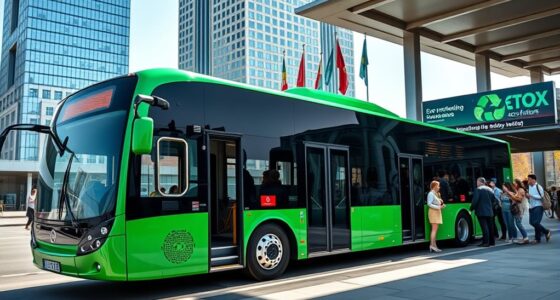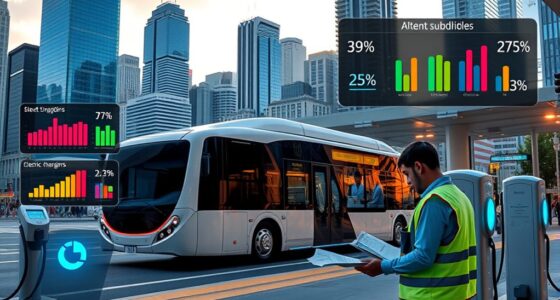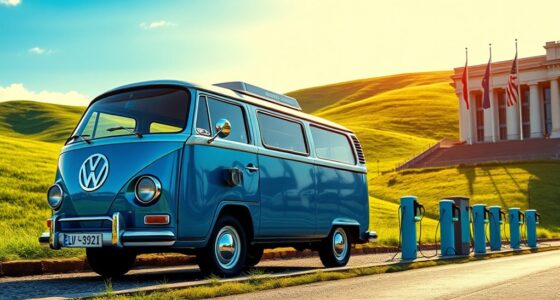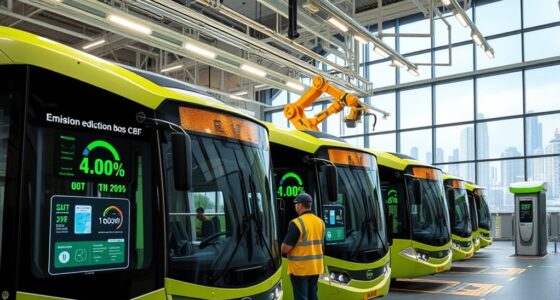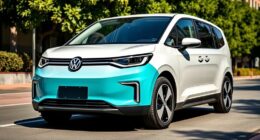The 2035 gas car ban means you’ll need to explore options like electric conversions or specialized exemptions to keep your VW Bus on the road. While traditional gas engines will be phased out, innovative solutions are emerging to preserve the iconic look and feel of your vintage vehicle. Balancing environmental goals with cultural heritage can be challenging, but opportunities are arising for enthusiasts like you. Discover how industry shifts could shape your VW Bus future.
Key Takeaways
- The 2035 ban will prohibit new gas-powered vehicle sales, impacting vintage VW Bus ownership and future availability.
- Electric conversions or remakes may be necessary for VW Bus enthusiasts to keep their vehicles legal and roadworthy.
- Preservation of the classic VW Bus will involve balancing authenticity with compliance through electric updates.
- Regulatory changes could incentivize or require EV modifications, affecting the value and originality of vintage Buses.
- Industry innovations aim to help VW Bus fans maintain their vehicles’ cultural significance within new environmental standards.
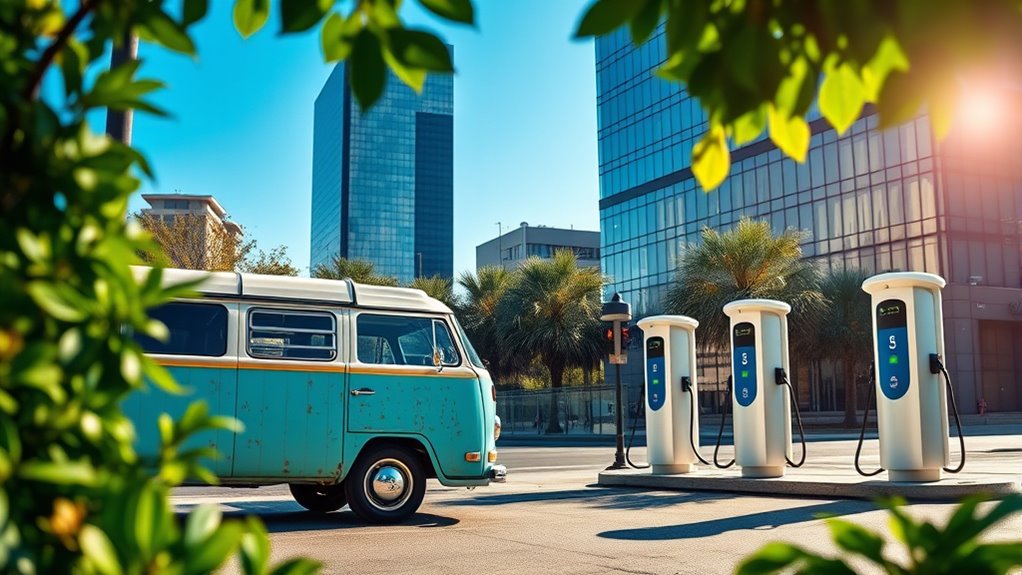
With the upcoming gas car ban set for 2035, automakers and enthusiasts are reevaluating their options—especially when it comes to iconic models like the VW Bus. This shift toward electric vehicles (EVs) signals a major change in how we approach classic cars, blending innovation with the desire to preserve automotive history. For VW Bus fans, this transition raises questions about whether they’ll be able to keep their beloved vehicles on the road or if new regulations will make that impossible. As the industry moves toward an electric transition, the challenge is balancing environmental goals with the preservation of classic models that hold cultural and nostalgic significance.
Many enthusiasts see the VW Bus as more than just a vehicle; it’s a symbol of freedom, counterculture, and adventure. The idea of replacing such a cultural icon with an electric version sparks debate about authenticity and heritage. Automakers are exploring ways to create EV adaptations that retain the look and feel of the original, allowing fans to enjoy the classic aesthetic while benefiting from modern, eco-friendly technology. This approach aims to facilitate classic preservation by offering electric conversions or specially designed electric models that stay true to the vintage design. These efforts could enable owners to keep their buses running without contributing to emissions, aligning with the broader goals of a cleaner environment while honoring the vehicle’s legacy.
Automakers develop EV adaptations that preserve the VW Bus’s iconic look and heritage for eco-friendly preservation.
However, there are hurdles. Converting a vintage VW Bus to electric isn’t straightforward. It requires significant modifications, which can be costly and technically complex. Plus, some purists argue that no electric conversion can truly replicate the character of a classic gas-powered engine. Still, as the electric transition accelerates, more companies are developing kits and solutions tailored for vintage vehicles, making preservation more feasible. Such initiatives help ensure that the VW Bus remains a tangible part of automotive history, even as technology evolves. Additionally, the incorporation of natural materials and vintage-inspired design elements can help preserve the iconic aesthetic during conversions.
For you, as a fan or owner, this means weighing your passion for the classic against the realities of future regulations. Do you pursue an electric conversion to keep your bus legal and environmentally conscious? Or do you consider other options, like vintage car exemptions or collector status? The push for electric vehicles isn’t just about emissions; it’s about reimagining what classic preservation can look like in a new era. While the 2035 gas car ban presents challenges, it also opens opportunities to innovate and keep the spirit of the VW Bus alive—whether through electric remakes or carefully maintained originals. Ultimately, the future of your VW Bus depends on how you choose to adapt within this changing landscape.
Frequently Asked Questions
Will Vintage VW Buses Be Exempt From the 2035 Ban?
You might wonder if vintage VW buses will be exempt from the 2035 ban. Currently, some regions include a heritage clause, which could offer a vintage exemption for classic vehicles like your VW bus. However, this isn’t guaranteed everywhere, and rules vary. Keep an eye on local legislation, as the heritage clause may protect certain vintage models, but it’s not a universal guarantee. Stay informed to protect your beloved bus.
How Will the Ban Impact the Resale Value of Classic VW Buses?
Imagine your classic VW bus skyrocketing in value like a rocket to the moon! Environmental regulations, especially the 2035 ban, could make vintage VW buses even more desirable, boosting classic car valuations dramatically. You might find your beloved bus becoming a rare gem, prized by collectors. While some worry about restrictions, others see this as a golden opportunity, turning your vintage ride into an investment that could outshine even the stars!
Are There Any Exceptions for Collector or Heritage Vehicles?
You might wonder if collector exemptions or heritage vehicle rules apply to your VW bus. Currently, some regions offer collector exemptions or special permits for heritage vehicles, allowing older cars to be driven despite emissions bans. However, these exemptions vary by location and often have strict requirements. Check local regulations to see if your vintage VW bus qualifies under heritage vehicle rules, as this could help preserve your classic while complying with future laws.
What Alternative Transportation Options Will Be Available for VW Bus Enthusiasts?
Think of your options like a toolbox for your adventures. You could rent electric scooters for quick trips or join ride-sharing programs for longer journeys, keeping you mobile and eco-friendly. While classic VW buses may face restrictions, these alternatives let you enjoy the open road without emissions. Embrace new tech, and you’ll find exciting ways to keep your passion alive, even as the landscape shifts.
How Will the Ban Influence Aftermarket Parts and Restoration Markets?
The ban will substantially impact your ability to find original parts, pushing you toward electric conversions and aftermarket modifications. As traditional gas engine parts become scarce, you can explore electric kits to upgrade your VW bus. This shift encourages creativity and customization, allowing you to maintain your vehicle’s charm while adapting to future regulations. Embracing these changes guarantees your bus stays functional and stylish, even in a rapidly evolving automotive landscape.
Conclusion
So, with the 2035 gas car ban on the horizon, your classic VW Bus might seem destined for the past. But could this mean new adventures with electric conversions or vintage restorations? Don’t let the future dampen your passion—embrace the change and find creative ways to keep your love for the Bus alive. After all, isn’t the journey more important than the destination? Keep dreaming and driving, no matter what’s ahead.


